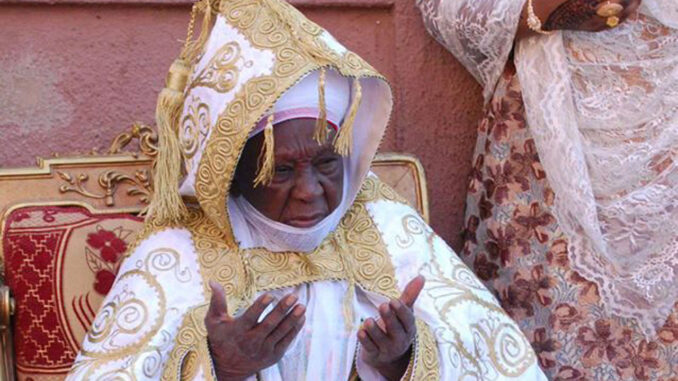
Emir of Daura, Dr. Umar Farouk Umar’s lamentation the other day that the spate of insecurity in the country is at the moment worse than civil war time aptly captures the degenerate state of affairs with regards to the insecurity of lives and property in the country. Life in today’s Nigeria is short, brutish and unsafe. This is no longer controvertible.
The country has literally been overrun by bandits, killer herdsmen, kidnappers, armed robbers, rapists, cultists and other sundry armed criminal gangs, who terrorise and kill citizens indiscriminately.
Specifically, from the nation’s capital to all the states in the federation, through the old capital of the northern region, Kaduna, the Caliphate in Sokoto, Zamfara, Kebbi through the eastern region of Enugu to Port Harcourt, old western Nigeria’s six states where they now have a regional security paramilitary force, Amotekun for security and to the epicentre of terrorism, the North East, no place is safe. And despite claim by military authorities that the insurgents and criminals have been ‘‘technically defeated’’ the situation seems to have overwhelmed the authorities. The Emir of Katsina, President Buhari’s home state raised the alarm over what he described as multifaceted security threats facing the nation, saying what Nigeria is experiencing now is worse than civil war.
The concerned Emir solicited for prayers, advice and goodwill of all Nigerians, especially elders, traditional and religious leaders in the country, to overcome banditry and other security challenges the way the civil war was overcome with prayers, without sentiment. This is serious challenge to leadership in the country.
The Emir’s frustration was shared by the pan-Yoruba socio-political group, Afenifere; the Igbo socio-political organisation, Ohaneze Ndi-Igbo and the pan-Niger Delta Forum, PANDEF at the same time.
It is not for a trite reason that the Emir’s view was shared by major stakeholders in the polity. Corroborating Dr. Umar’s view, former Minister of Information and National Leader of PANDEF, Chief Edwin Clark, expressed concern that more Nigerians are being killed now than when we were in the heat of the civil war more than five decades ago.
It should be of huge concern to the authorities that even the elders in various parts of the country are decrying unbridled killings in the country. It is for this same reason that the people and even parliamentarians are demanding that the Service Chiefs should be changed or retired. It is unfortunate that the President has not been listening to what the people and their representatives in government have been suggesting about insecurity. This newspaper has been consistent on the national call on the president to rejig his security architecture that hasn’t been working.
Since 2009, an insurgency group, Boko Haram, has launched ferocious attacks on the Nigerian State and its people. At the initial stage, the Federal Government under President Goodluck Jonathan took it as a domestic uprising that could easily be quelled by the police. But the unscrupulous group has since intensified its attacks on churches, markets, public buildings including the Police Headquarters in Abuja, the United Nations Offices, among others. Even concerns raised that Boko Haram has been transforming into a well-organised terror group has not elicited response that could comfort the people about safety of lives and property.
Boko Haram has had ghastly exploits. They have had a field day. They have ravaged villages in Borno, Yobe and Adamawa states and capped that with the abduction of more than 200 Chibok school girls in Borno in April 2014.
When Buhari took over from Jonathan, the expectation was high that the situation would change. It was thought that the seeming invincibility of Boko Haram would be upturned. As Buhari moved the theatre command headquarters to Maiduguri, the clock began to turn against Boko Haram. Then Nigerians heaved a sigh of relief as government announced that Boko Haram had been seriously depleted. But suicide bombers never gave a breathing space. They continued to strike incessantly, killing and maiming innocent people.
The adduction of 110 Dapchi school girls in Yobe State, again put the whole fight to ridicule. How on earth did it happen right on the watch of the security forces?
So, going by the spate of killings, what extra security measures in the context of homeland security has Nigeria instituted to deal with insecurity that is getting out of control? What is worse, most people believe that the police as presently constituted, cannot contain the already ticklish insecurity even as soldiers keep confessing that fighting terror is different from fighting in conventional warfare they have had training for. As this newspaper has consistently noted, adopting state-police policy is surely a way forward. It will go a long way in securing remote communities where the federal police cannot cover. This is in addition to the emerging regional security outfits such as the Amotekun security network in the South-West, which the other zones are gearing up to replicate.
In the main, the Federal Government should not continue to play politics with the idea of restructuring the police force, in the circumstances. Procrastination has stolen their thunder, in this regard and the nation has been the worse for it. How do we live in a country where families can be violently wiped out by insurgents and criminals in a twinkling of an eye and the perpetrators of such crimes disappear? The authorities should stop toying with the spate of insecurity that is ravaging the country. They should stop inviting foreign direct investors amid this uncertainty in the land. It is curious that if Buhari, a General in the army has problem securing Nigeria, people are bound to wonder who else would do it. That is why it is in the interest of the commander-in-chief to brace up to fulfill a constitutional requirement that: the welfare and security of the people shall be the primary purpose of government – before it is too late.
END

Be the first to comment